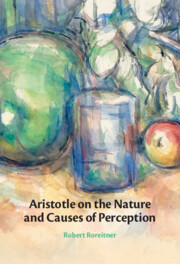Aristotle on the Nature and Causes of Perception
In this book Robert Roreitner offers a fresh interpretation of Aristotle’s philosophically intriguing answers to what the nature of perception is, how it can be explained, and how perception is distinguished from mere appearance. He argues that for Aristotle, perception is a complete passive activity, and explains why this notion merely appears self-contradictory to us. He shows how Aristotle succeeds in integrating causal, qualitative, and relational aspects of perception, and explains why he is neither a ‘spiritualist’ nor a ‘materialist’. He presses and resolves an unappreciated dilemma for Aristotle’s hylomorphic account of perception and the role of the soul therein. This rich study shows that although Aristotle’s understanding of perception may be in many respects outmoded, its core insights remain philosophically engaging. This title is also available as Open Access on Cambridge Core.
Robert Roreitner is Assistant Professor of Philosophy at Charles University, Prague. He is a co-author of Aristotle on the Essence of Human Thought (2024).

